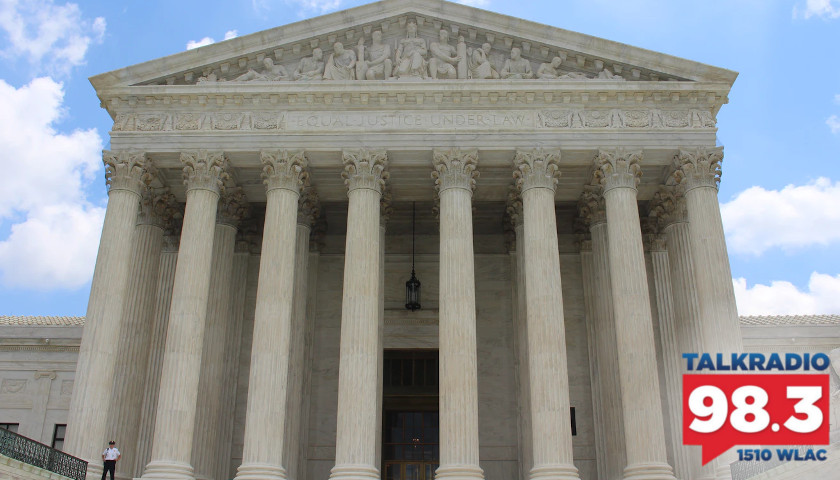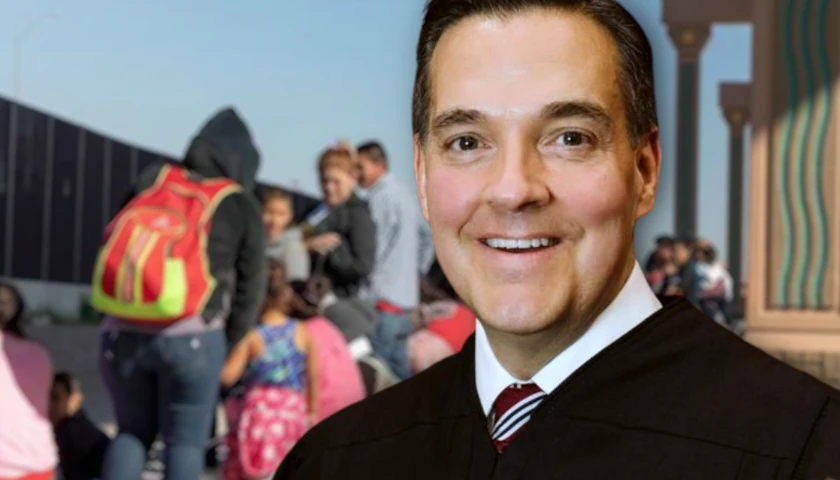Live from Music Row Friday morning on The Tennessee Star Report with Michael Patrick Leahy – broadcast on Nashville’s Talk Radio 98.3 and 1510 WLAC weekdays from 5:00 a.m. to 8:00 a.m. – host Leahy welcomed in-studio all-star panelist Crom Carmichael.
During the second hour, Leahy and Carmichael discuss Juneteenth and how Trump has done more for the black and Hispanic communities than previous presidents. The men also touched on the recent position that Chief Justice John Roberts took on an executive order that was signed eight years ago by former President Obama called Deferred Action for Childhood Arrivals.
Leahy: And joining us in the studio our good friend and the original all-star panelist, Crom Carmichael. Crom good morning.
Carmichael: Good morning Michael. It’s Juneteenth.
Leahy: Juneteenth
Carmichael: It’s the day that the Republican Party freed the slaves.
Leahy: That’s right.
Carmichael: And the Democratic Party fought it every step of the way.
Leahy: Every step of the way.
Carmichael: And they still do.
Leahy: Still do.
Carmichael: This is going to be an interesting election to see how many black people have come to realize that the Democratic Party treats them as if they are in bondage.
Leahy: What’s your thought on that? I’m hearing reports that despite all the riots going I’m hearing that the president is getting more support from the black community.
Carmichael: The riots should give him more support because they are the ones who are most affected. Let’s look at what a black American who is not a rioter and that is the 99 percent. These rioters are a very small group of people. But they can do incredible damage when the Democrat mayor of a city tells the police, don’t do anything.
Leahy: Yes. Which is happening all over.
Carmichael: Which is what’s happening all over the country. So the law-abiding black Americans and the law-abiding Hispanic Americans look at this and they are coming around. And Trump has been working very hard to garner support in the black and Hispanic communities because he indicates through his policies and through his speeches that he cares about unemployment.
And he loves the fact that his policies have reduced unemployment among black and Hispanic Americans to the lowest level in recorded history. In addition to that, their wages are rising at the fastest rate in over 30 years. Now, black and Hispanic people can count. They see this. It’s Democrats who are trying to keep them down.
Keep them uneducated. Keep them in poor schools. So Juneteenth is a day where we should encourage minority communities and white people who care about the plight of minorities to rise up and say enough of this union garbage of controlling education. Enough of these welfare policies that keep low-income people in low-income positions. And to start encouraging policies that offer hope and that offer not just hope but actual change for the better.
Leahy: Speaking of change. In the category of change for the worse, yesterday the Supreme Court made a stunningly bad decision. Five to four. The liberals in this case were joined by Chief Justice John Roberts. A five to four decision.
Now, this has to do with the ruling on an executive order that former President Obama signed eight years ago called the Deferred Action for Childhood Arrivals program which allowed children here who came here illegally to remain in the country. Everyone has acknowledged that that was an unconstitutional executive order. Except and I think even the supreme court acknowledged that the order itself was unconstitutional.
Carmichael: Unconstitutional or illegal?
Leahy: Unconstitutional for the President eight years ago to say that it unilaterally establishes immigration law. That’s what he did with this Deferred Action for Childhood Arrivals program. This was the assertion that it was universally accepted.
Carmichael: So the courts had never ruled on that specifically?
Leahy: The Supreme Court had not ruled on that issue specifically. That is correct. But it was acknowledged widely that the president cannot legislate by himself.
Carmichael: Let me ask this question. It’s my understanding that the Democrats supported Obama’s executive order and claimed it was a legal executive order. But here it’s my understanding that an executive order by one president can be overturned by the executive order of a subsequent president.
Leahy: That would be our constitutional precedent.
Carmichael: That’s where you get into the constitutional precedent.
Leahy: Exactly.
Carmichael: It’s my understanding that the Roberts decision said that while Trump’s repeal if that’s the right word or overturning of Obama’s executive order that in itself was lawful he was ruling against it because he didn’t give a good reason.
Leahy: That’s exactly right.
Carmichael: Does that mean that he can issue another executive order with a good reason?
Leahy: Here is the question. I looked at that. He had a good reason. But Roberts determined that it wasn’t a good reason. Where does the chief justice get to say it’s a good reason?
Carmichael: I’m 100 percent in agreement with the idea that it is not Roberts’s job or the court’s job. Let me give you another example. The president has the absolute right to fire the FBI director.
Leahy: Yes.
Carmichael: Whether he gives a reason or not he can fire he can say I did it because I can. Could the Supreme Court say no you can’t? That’s not a good reason?
Leahy: Under John Roberts’s opinion.
Carmichael: Under John Robert’s opinion. What he’s done is he’s eviscerated the executive branch’s ability to operate unless John Roberts thinks it’s a good reason. And that’s absolutely ridiculous.
Leahy: It’s beyond ridiculous.
Carmichael: Yes. That’s even better. You can expect the four liberal justices to rule the way they did because that’s just what they do. They don’t see the law as the law.
Leahy: Right.
Carmichael: They see their job as to play politics.
Leahy: My question to you is, what is happening with John Roberts? What’s going on in his mind?
Carmichael: I’m not a mind reader. So I don’t know. I’m very very disappointed in Roberts. I am also disappointed in Gorsuch’s position on the LGBTQ.
Leahy: Re-interpreting the Civil Rights Act…
Carmichael: In terms of the application of the actual law. But, having said that. It would then to me be incumbent on the six justices who voted that direction.
Leahy: On the previous decision.
Carmichael: On that you can’t discriminate. Therefore if conservative minorities show up and apply for jobs they can’t be denied. And I would love for them to be very explicit about their conservative views so that now we get into that you cannot discriminate against people based on their ideas. Especially if the entity in question is an idea type entity like a TV network. Or a newspaper.
Or a university. And so that would get to be very interesting. That was on that decision. But on DACA it makes no sense at all. But it is similar to the decision that the court had that you can’t add whether or not you are a US citizen or not to the census because that was also, they didn’t give a very good reason. That was their reason for the ruling.
Leahy: That’s the standard now.
Carmichael: That’s now the new standard.
Leahy: That’s the Roberts standard. It’s a bad troubling standard.
Carmichael: That means actually you could give a very good reason that he disagrees with.
Leahy: Absolutely.
Carmichael: And then he would be able to say I don’t agree with that reason. Then all of a sudden we now have a dictatorship in the supreme court. And we are moving rapidly in the direction of not being a nation of laws. And you know that we are moving in that direction rapidly when all the Democrats say that we are a nation of laws. (Leahy chuckles) And that nobody is above the law. They say that over and over and over again.
Leahy: You were watching Tucker Carlson last night.
Carmichael: Yes. (Leahy laughs) But Tucker is not the first one. And it’s not the first time Tucker himself has pointed out how ludicrous it is because they are showing all the rioting and the looting. And then the quotes while all that is going on, no one is above the law.
Leahy: Here’s the trouble. We’ve lost, if we’ve ever had him, we’ve lost Justice Roberts. He’s gone to the other side.
Carmichael: Well I don’t know if he’s gone to the other side all the time.
Leahy: On the important decisions he’son the other side.
Carmichael: And who appointed Roberts?
Leahy: George W.
Carmichael: And who reported Souter?
Leahy: His daddy.
Carmichael: His daddy.
Leahy: They were both awful.
Carmichael: And the second Bush wanted to appoint somebody who had no judicial record.
Leahy: Remember impeach Justice Warren? (Giggles) We might see that coming back with Roberts.
– – –
Tune in weekdays from 5:00 – 8:00 a.m. to the Tennessee Star Report with Michael Patrick Leahy on Talk Radio 98.3 FM WLAC 1510. Listen online at iHeart Radio.




